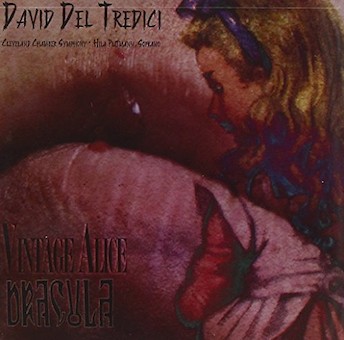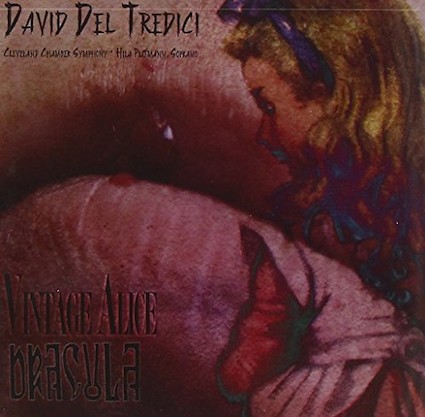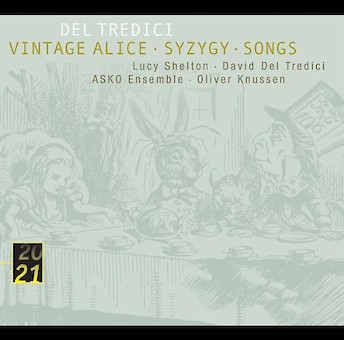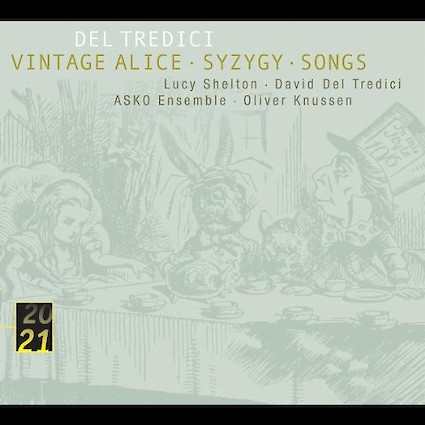The action begins with the Hatter singing for Alice a song he had sung previously at a great concert for the Queen: 'Twinkle, twinkle, little bat!' This verse, of course, parodies the opening of June Taylor's well-known poem, 'The Star.' To emphasize the parodistic aspect of the Hatter's Song, I use with it, twining in and out of the texture, that very famous tune always associated with the Taylor poem. In my setting, too, I have taken for inspiration the words of the Queen to the Hatter after his eccentric performance at that 'great concert'- 'He's murdering the time! Off with his head!'
'Murdering the time,' in fact, becomes a creative image throughout the entire piece. As the different episodes that follow the Hatter's Song unfold, all are treated to, and affected by, this idea of distortion and scrambling.
"The accordion sighed 'ordinary chords,' the banjo and mandolin twanged and tinkled, the soprano saxes intertwined with sinuous lines and the tunes went round and round the orchestra like a snake swallowing its tail. Marvelously crazy, inordinately clever.
Del Tredici gives us a fine scramble of 'Twinkle, twinkle, little bat,' some exquisite coloratura Sprechgesang, assorted noble jumblings of 'God Save the Queen' (Presumably of Hearts), some of the lushest phony cadences this side of 'Star Wars' and a very neat quodlibety-split just before the superclimactic coda. It gets curiouser and curiouser, but never too curious.
;Vintage Alice extols theatricality and whimsy. It draws on as many sources and techniques as can serve those qualities, among them cabaret band fragments that sound particularly Ivesian. It is charming, cheering and arresting in every way, not least in its brilliant orchestrations.
Vintage Alice was as clever as you can imagine, by one of the most polished and detailed craftsman among composers, and genuinely funny.
It's hard to realize that David Del Tredici turned 70 last year, A perennial "bad boy" of new music, he's retained his edge, playfulness, and subversive combination of decadence and innocence.
These two discs make a fitting, if belated, birthday present.
The big news is the return of Final Alice (1976) to the discography. Del Tredici named it that because it sets the conclusion of Alice in Wonderland (at the time it also seemed it would be the last in his series of settings of that book, but he‘s returned to it numerous times since). Final Alice is really unlike anything before it, though it has sure roots. The most important is the revival of a lost tradition, that of melodrama, the art of a sung theater piece in a concert setting. As a one-woman bravura show, it asks the singer to take on all the roles of the characters and be narrator; to both speak dramatically and sing at fever pitch for almost an hour, non-stop; and to switch styles on a dime, from music hall to slapstick to grand opera. By the end the chaos is so overwhelming she has to whip out a bullhorn to compete.
Del Tredici had already gained notoriety as a trained serialist who threw it all away to embrace a lush, indulgent neo-Romantic language, and many have never forgiven him. But in retrospect it was absolutely the right move. For one thing, it was him, the music took on enormous honesty. And along with George Rochberg and William Bolcom, he helped to invent American musical postmodernism, which has never been as ironic and academic as its counterpart in the visual arts. Subversive always, but all three of these composers have never abandoned their hearts in order to write this music that reshuffles all the sources and questions our relation to them.
Final Alice I think is a masterpiece. I still get chills at the end, when the poignant "Acrostic Song" (very Elgaresque) unspools, with the orchestra chanting the first letter of each line, which spells out the name Alice Liddell. I now hear it as an authoritative tribute and send-up to Ronsenkavalier, and I keep discovering things I didn't notice at first (like the oboe tuning A that starts the piece, and is the last note/sound in the entire work). While some have criticized the piece as being reactionary, in fact nothing could be farther from the point. It is music that could have only been written at its historical moment. Its sheer craziness, chaotic theatricality, and love/death embrace of tonality is part and parcel of America in the 1980s. And it's perhaps the definitive approach to the sweetness and terror of the original text.
The Innova disc presents a pair of chronological bookends to Final Alice. Vintage Alice dates from 1972, and sets the famous Mad Hatter's Tea Party scene (the title has nothing to do with Carroll, coming instead from the Paul Masson Winery‘s commission). Obsessively focused on the tunes Twinkle, twinkle little star and God Save the Queen, it uses even more experimental techniques than Final Alice in particular, polytonality and poly-tempos. As in Final Alice, there's a folk group, and the singer narrates, takes all the roles, and moves into extremes of repetition and register. In a sense, it feels like a dress rehearsal for its longer, more ambitious descendent.
Dracula is from 1999, and sets a prose poem by Alfred Corn, "My Neighbor the Count," which relates a tale of progressive seduction, debasement, and enslavement of the narrator by the eponymous vampire, all from her victim's viewpoint. It has a brilliant, day-glow orchestration, cinematic in its high definition and bright colors. It uses the theremin near its conclusion as an aural symbol of the union between victim and oppressor. The piece is both funny and scary. Del Tredici treads a very narrow path here between camp and compassion, and for my money he pulls it off. Only the very ending feels a little unfulfilling after the long buildup, but it doesn't fatally undercut the overall impact of the whole work.
Soprano Hila Plitmann is a knockout in both pieces. She's a worthy successor to Hendricks. She has the sort of fluency of so many great young American singers nowadays, which allows her to switch effortlessly from speech to naturalist theatrical singing, to full operatic aria, to more experimental extended techniques. Her acting skills are extensive and often hilarious, as she deftly impersonatcs the Mad Hatter, the Dormouse, and Count Dracula. There was a wonderful recording on the DG "20/21" series of Vintage Alice with Lucy Shelton, Oliver Knussen, and the ASKO Ensemble, but it's already out of print, so lnnova's is now the work's sole representative, and does have the advantage of the composer as conductor.
The Decca release of Final Alice is a reissue of the original LP, and it's hard to imagine this performance will ever be bettered. Hendricks is spectacular, and the CSO never sounded more sonically Technicolor. Del Tredici shows that over three decades he's been able to keep his edge, and even though the music may have moved towards a slightly more Hollywood sound and presentation, it's still anything but comfortable, I have a feeling his is a body of work, which despite possessing an in-your-face quality for decades, is only now starting to come into clear focus. It simply cannot be categorized, yet fits seamlessly into a tradition – though which tradition may be up to you the listener to decide. But these are both a joy to behold, and Final Alice is now a strong contender for my Want List.
Audio (13)
Recordings (2)


Vintage Alice, Dracula
2008, Innova (669)Works
Performers
- Hila Plitmann
- David Del Tredici, Conductor
- Cleveland Chamber Symphony


Vintage Alice / Syzygy / Songs
2004, Deutsche Grammophon (447-753-2)Works
Performers
- David Del Tredici
- Lucy Shelton
- Oliver Knussen
- Asko Ensemble
Part of DGG 20/21 Series